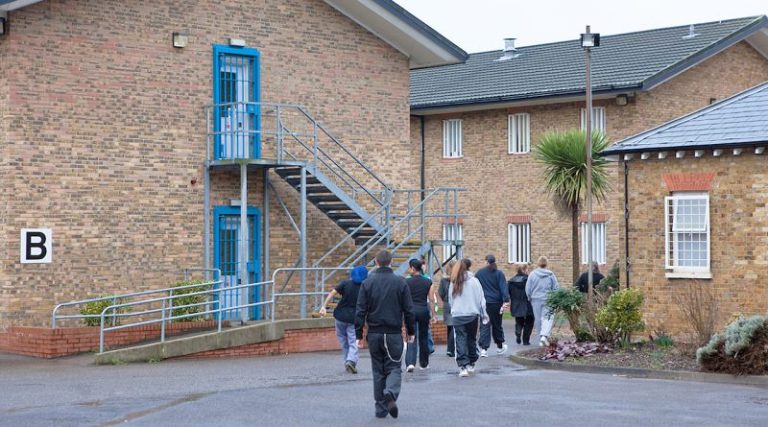Guest blog: rehabilitation is always better than incarceration, says Pact prisons charity
The Government is carrying out its plan to increase by 20,000, the number of prison places over the next few years. In my hometown of Leicester, the shabby Glen Parva Young Offenders Institution was finally closed in 2017 with a plan to build a new prison on the site. Having been designed to hold 1500 prisoners when it opens this summer, it has recently been agreed that HMP Fosse Way will now be extended by a further 250 places. Local press is encouraging us to be pleased about the jobs this huge private-sector prison will create. Elsewhere so-called Rapid Deployment Cells are being craned into prison grounds to increase capacity in the existing estate. Minister for Prisons and Probation, Damian Hinds, explains that, ‘Prison cells protect the public by making sure we have enough space to put dangerous offenders behind bars – that’s why we’re investing £4 billion to deliver 20,000 extra places.’
In England & Wales, we already incarcerate more people per capita than any other Western European country. It is already the case that children are more likely to experience having a parent in prison than divorce. There is a staffing crisis in prisons which in many places limits the opportunities prisoners have out of their cells learning new skills and the number of in-person family visits taking place. Meanwhile, National Audit Office research demonstrates that the proportion of people imprisoned is not related to the level of crime a country experiences.
Pact, the national Catholic prison charity, has been supporting prisoners and their families for 125 years. Arriving at a prison to visit someone you care about can be a pretty horrible experience. You will find our staff and volunteers in more than 60 prison Visitor Centres across England & Wales, providing a welcome for visiting children and families and sharing practical advice as well as a listening ear.
Today we are an amazingly diverse charity serving people of all faiths and none. In the language of the church, we believe that everyone can be redeemed. In a society struggling with divisions, we understand that good relationships matter more than anything in the work we do. Our innovative projects include employing social workers who support mums in prison to maintain their identity as parents who can still be involved in their children’s lives. In HMP Brixton and in Isis Young Offender Institute, we provide wraparound practical and emotional support to prisoners and their families from the first days in custody, through the sentence, and for up to six months after release. These consistent relationships help to support everyone’s health and wellbeing through the challenges of being apart and then making a fresh start together.
There is a wealth of research outlining the factors which reduce crime and make our communities safer. Increasing the number of prison places does not feature in such research. However supporting prisoners to maintain and nurture family relationships does reduce the chances of returning to crime by 39%. The data reflects what Pope Francis says In Fratelli Tutti, ‘No one can face life in isolation…we need a community that supports and helps us.’
We know that there are lots of people in prison with mental health conditions. I spoke to a magistrate recently who admitted that he was uneasy giving a custodial sentence to a person who really needed mental health treatment – but there wasn’t any, so what could he do? Being seen to be ‘tough on crime’ has become a pervasive theme in the political rhetoric on all sides. When we look at data that tells us people in prison are more likely to be from minoritized ethnic backgrounds, to have mental health conditions, to be care-experienced, to struggle with reading and writing, we might ask ourselves what we are really doing when we set out to send more ‘people’ to prison. Isn’t this an uncomfortable question for us as Christians? In Fratelli Tutti, Pope Francis goes on to say, ‘a community can be rebuilt by men and women who identify with the vulnerability of others, who reject the creation of a society of exclusion, and act instead as neighbours, lifting up and rehabilitating the fallen for the sake of the common good.’ In fact, the Ministry of Justice’s own research says that community sentencing is more effective than short prison sentences.
At Pact we work at the intersection of criminal justice, child and family welfare, and mental health and wellbeing. By supporting people to live healthy, crime-free lives we serve the common good. This work is both difficult and valuable. We would like to see investment not in more prison places, but in mental health services, in substance misuse work. We would like to see prisons used sparingly and as places of real rehabilitation. How much more effective might our criminal justice system be if we were all focussed on working together genuinely ‘lifting up and rehabilitating’ members of our communities.
I invite you to Pact’s Sir Harold Hood Memorial Lecture on 24th May. We will be reflecting further on what Christian faith has to offer a radical reshaping of the criminal justice system. Our keynote speaker is Dr Chijioke Nwalozie, a Senior Lecturer in Criminology at De Montfort University who has worked in prisons in this country and in Nigeria.
Link: Sir Harold Hood Memorial Lecture 2023 | Prison Advice and Care Trust

Theresa Alessandro is Pact’s Catholic Community Engagement Manager
Contact: parish.action@prisonadvice.org.uk

